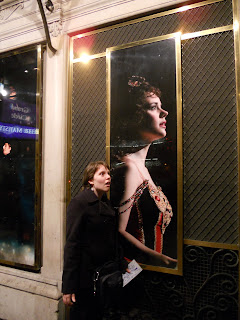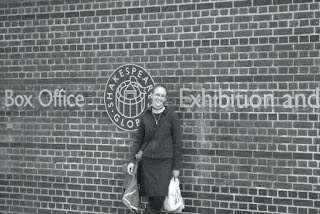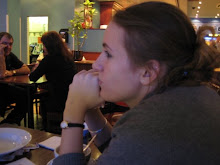So, this is my attempt to think through, in a space that is nonthreatening in its informality, some of my ideas for the theory essay that is currently leaving me wordless and angsty. I would like to claim (though my college friends would have to verify) that I've never struggled so much with an essay in my life. That I've never been so utterly incapable of coherent thought, or worthwhile expression. Maybe it's the pressure of trying to create something worthy of Oxford (whatever that means), or maybe it's the attempt to reflect on pure, unadulterated theory, without the grounding in literature and life. Or maybe I'm just out of practice. After all, other than two application essays and a few (short) creative writing pieces, I haven't written anything since graduating almost two years ago.
But I really want this OUT OF THE WAY. Done with, so I can move on to better things. Things like Icelandic literature and books on myth.
Here is what I do know:
It is an essay that will touch on the work of Cixous. And Virginia Woolf. And maybe Kristeva, Irigaray, and others.
It is an essay about women. About women and their relationship to writing. About women and the metaphor of writing the body. Feminine ecriture, writing is woman's, and all that.
Toril Moi has an essay, written in 2008, that points out one of the main complications that seem to lie at the heart, not just of women and writing, but of feminism and theory in general. There seems to be a tension, a conflict even, between political feminists and literary theorists (be they queer, postmodern, etc.) Between those who need the signifier "woman" to retain it's meaning and significance, and those who wish to displace the binaries (and the signifiers) altogether. In writing, this issue takes the form of dissonance: a political mandate to read and study the work of women writers vs. the theoretical conjecture that the author (and gendered subject) is dead.
Moi argues that the feminists and theorists have no real answers for each other, and generally escape conflict by avoiding the debate altogether.
But I think there's a way out of this seeming standstill, and always has been. When Roland Barthes wrote about the death of the author, he was affirming, in many ways, what feminists already knew: that the patriarchal, masculine subject -- the mythic phallus, impenetrable and whole -- was an illusion. A protection, as Peggy Kamuf puts it, between the boundlessness of an unlimited textual system and our own power to know. And it was time, Barthes argued, for the myth to be put to death, and the text liberated from the constraints of the Author-God.
But this displacement of the omnipotent (male) Author, rather than erasing the political significance of women's writing (as so many feminists seem to fear) opens new doors to symbolically re-interpret the relationship between gender/sex and writing.
Virginia Woolf famously asserted, in her 1928 treatise on women and writing, that great writers are androgynous (and must not think of their sex). She also asserted, somewhat contradictorily, that women must write as women, and not as men.
Taken on closer evaluation, these two statements prove to be related, for Woolf seems to imply that to write as a woman -- a real woman, and not the stagnate image created in the patriarchal conscious -- is to be androgynous: fluid, multiple, ever-shifting, changing, never coded, never closed. It is, in short, to be all that phallogocentricism, in its obsession with stability, wholeness, and rigidity, is not.
Helene Cixous makes a similar argument, stating that woman has never lost her bisexuality.
As the repressed/oppressed/negated signifier in the binary man/woman, woman holds no commitment to the phallocentric order. In fact, it is the very passion with which patriarchal discourse has attempted to obliterate her that provides the means for her to break free. For the signifier "woman," subsumed/submerged/swallowed/annihilated by its partner "man," can never hold the weight of the real woman, with breath and blood, body and voice. All woman has to do is show up -- write her body, her very self, into being -- for the existing discourse to crash and burn.
And since woman has no allegiance to the phallocentric ideal of unity and oneness (for, as Luce Irigaray so blatantly points out, woman's sexuality is not one, but two, and not two, but many), she is free to be nothing and everything; to return and start again from elsewhere; to never say exactly what she means. Lacking a phallus to begin with, she is unfettered by the fear of castration. She could never claim to posses the (one) truth, so she has no need to defend it.
And since woman is multiple, and writing is multiple, Cixous can make her claim -- bold and threatening -- that writing is woman's.
For it is time for a new metaphor, not the Father-Author and his text, but the mother-writer and the boundless Other that she births. For, as Kamuf points out, the metaphor of the father is one of mediation and intentionality. It is to stand removed, and to present a work whole and unblemished, as one conceived it to be. The metaphor of motherhood, on the other hand, is one of illegitimacy, of borrowed names, and of deep, vulnerable, exposure.
It is the realm, not of the universal (masculine) truth, but of individual (feminine) experience. The realm of the embodied text (and it is, somewhat ironically, embodiment and specificity [rather than universality] that allow individual voices to survive in all their multiplicity and contradiction).
As Woolf writes in
Three Guineas, "As a woman, I have no country. As a woman I want no country." To be a woman is to be an exile, separate from the patriarchal structures of culture and power that have defined so much of our discourse and rhetoric -- our very tools for understanding the world. But as Kristeva states, all writing must come from a place of exile, for only then can we be set free from the bonds of the common sense. Or in the words of Cixous, we must trade places with the moon to gain a new perspective.
Luckily for women -- especially women who desire to write -- we already live on the moon, so writing with a new voice, untainted by the Law of the Father and the rules of a phallogocentric economy, isn't hard at all.
All we need is the courage to find our voice in the first place.




































